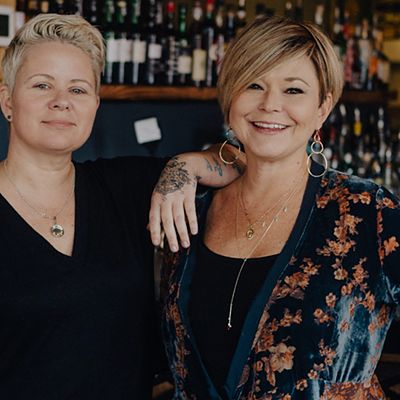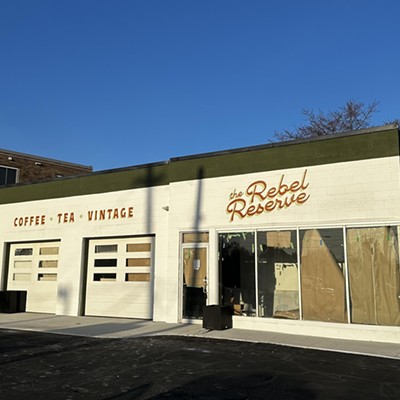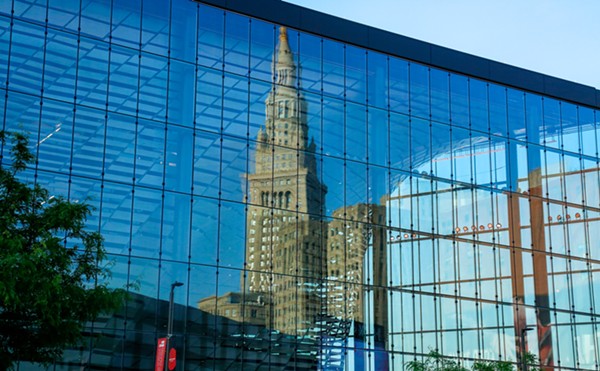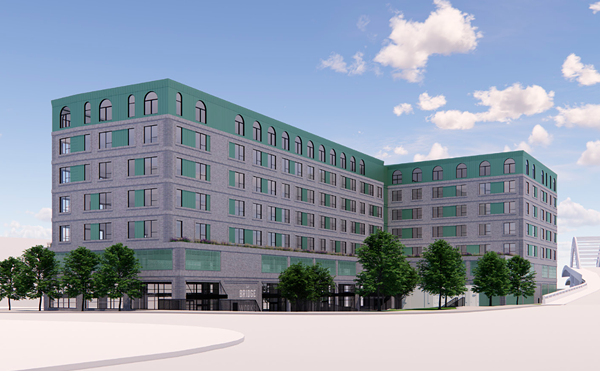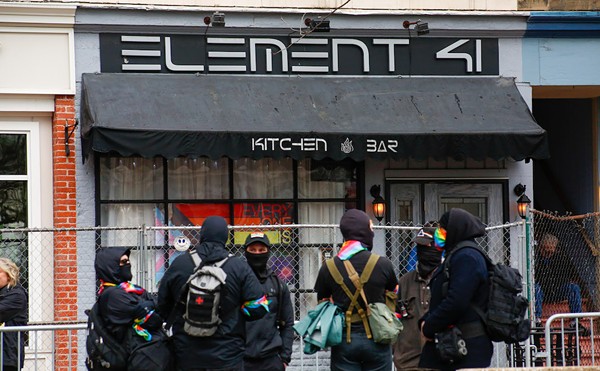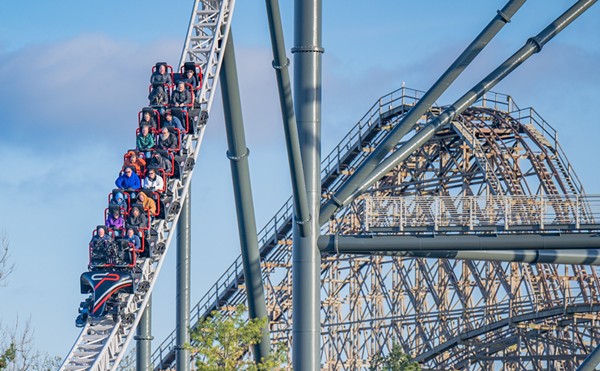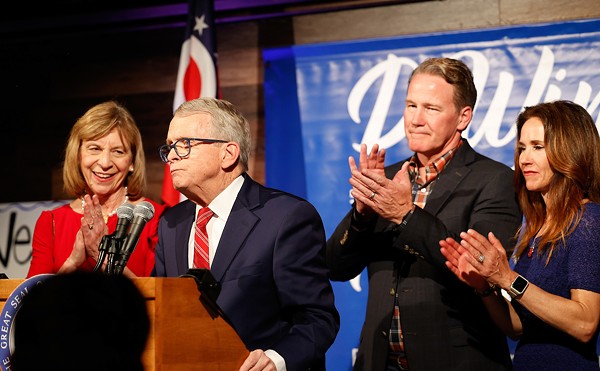Why I Drove 600 Miles to Ferguson to Help Get Protestors Out of Jail
By Jack Sanders on Wed, Aug 20, 2014 at 12:32 pm
[
{
"name": "Ad - NativeInline - Injected",
"component": "38482495",
"insertPoint": "3",
"requiredCountToDisplay": "5"
},{
"name": "Real 1 Player (r2) - Inline",
"component": "38482494",
"insertPoint": "2/3",
"requiredCountToDisplay": "9"
}
]
I got in my car in Ohio City Friday and drove almost 600 miles from Cleveland to Ferguson, Missouri. I’m not a protest tourist; I’m not a member of any organization. I’m not even really employed at the moment. I’m just an outraged guy with a law license and a ton of experience handling discrimination cases. And after the militarized police response to protesters, after they started shooting tear gas and making random arrests of media members and a local politician, I told my friend, another lawyer, “We should be down there, helping people who get wrongfully arrested during the protests.”
After a brief peace Thursday that stretched into Friday night, it seemed like I’d made the trip for nothing. At 10:00 p.m. I was a white man wearing a Mark Price jersey and driving alone down West Florissant Avenue — through the beating heart of the nighttime victory protests of young African Americans. There were cars constantly honking horns, cheering, signs (“NWA was right,” “HANDS UP, DON’T SHOOT,” among the less complex themes), people riding on top of vehicles, people in the streets.
The police have killed their son, brother, friend. They believe that it was done while he was surrendering, in broad daylight on a Saturday, in front of hundreds of windows of surrounding apartment buildings. They believe they and the entire town are the victims of institutional and systemic racism. They believe nothing will happen unless they act.
Traffic inched down the mile or so that took me an hour or more to complete, during which time I saw dancing, heard loud music, and witnessed no police officers. Things disintegrated about two hours after I’d finished my cruise through their neighborhood, and some minor looting took place, and stores selling beauty supplies and meat were then defended from looters by the protesters themselves. There would be a standoff, tear gas, rubber bullets, and threats of violence.
As I inched through traffic, I was approached by a man wearing a bandanna over his face.
“I’m glad you’re here. This is not about race, this is about police brutality, man.”
There’s a power here that has not yet been flexed, a strength that has truly and visibly manifested in the nightly absorption of physical abuse, gas and random arrests. Those protesters in the nighttime are the ones in control. That’s the reason they are being gassed and shot at. That, and racism. I love and respect your idealism, bandanna man, but it is, in fact, about race.
That’s the reason the state would impose a curfew from midnight to 5 a.m. the following night. Not because the protesters have really done anything to merit the curfew, but because the police are afraid of what any kind of surrender would mean.
***
I always wear a suit and tie if I think I might be arrested. First, I look like less of a shitheel, and second, if I actually end up in front of a judge, I want to be able to state incredulously that I didn’t expect to be arrested.
The next morning, the humidity, a fog of heat and sweat in Ferguson, colors everything far more than any evidence of the latest evening civil disturbance. Nevertheless, my assumption is that now random arrests will resume and by that afternoon I’m wearing a three-piece suite filled with sweat in a long protest march that fills the street, one much different than the night before.
I am the only one marching in the all-uphill march that thought it was necessary or wise to wear a suit, and that includes Rev. Jesse Jackson, who took an unexpected leadership role in the march. Jackson’s presence, and really the presence of all interlopers, including national and international organizations, is seen by some as having both a positive and negative impact. They have brought energy and attention, but also threaten to delegitimize a purely local cause.
I’m convinced that these perceptions are being shared with me because I am wanted, and when the call finally comes for me to provide legal help, my opinion is validated. I am here to provide “Jail Support” through an organization called Missourians Organizing for Reform and Empowerment (MORE) and when the call comes, and through a series of progressively more comfortable emails, I immediately volunteer for what I think is the most demanding job possible, knowing they will be hard pressed to turn me down.
“Jail Support” is a social safety net set up to identify, bail out, and welcome upon release, people who get arrested during the protests. Though a light rain, at 11 p.m., and facing a 12 a.m. curfew, I drive to the belly of the beast, the Ferguson Police Department. On department turf, I introduce myself to every member of the department that I see, including an officer parked in the parking lot monitoring protesters across the street. I’m an attorney, I work for an organization, and I’m just here to find out who’s been arrested, if anyone ends up being arrested.
Partly, I’m trying to be as pragmatic as possible. Mostly, I really don’t want to be shot with rubber bullets.
The Ferguson Police Department is under construction and there’s a weird maze of steps that took me up to a tiny lobby with shades drawn behind the bulletproof glass of the teller window, where I was reminded that this is a suburb with a population of only 21,000 residents and with about 50 police officers. Your local Apple Store might have as many employees.
As I enter the room, I am monitored by a camera and listened to by microphones. A booming police officer voice addresses me over a speaker and I respond while looking around at the ceiling as if I am talking to Jesus Christ himself floating in a cloud over my head. I am struck by the positive reaction to my very frank explanation that I am here to get arrested people out, and also to my request that I be permitted to wait in this three-chair fluorescent light lobby rather than be outside and myself be subject to arrest for a curfew violation.
More striking, however, is this: After I am approved to stay and wait all night for any arrests, a police captain emerges and explains that “on a night like tonight” that “arrestees will go straight to Clayton.”
Clayton is where the county jail is located. That’s where I have to go. How will I find the jail?
“That’s easy, it’s the largest building in Clayton. And by the way, you will be busy. People are already telling us they’re going to be arrested.”
The largest building in town. They must be so proud in Clayton.
As I walk back to my car through the light rain, beneath my broken umbrella, I announce to everyone in the group protesting outside the police department that when they are arrested they’ll be taken to Clayton. I give them the phone number for MORE to write on their arm and save in each other’s cell phones. It’s hard to find credible information, but again, I’m wearing a three-piece suit. People are passing the word around.
***
Clayton Township is completely empty by 11:30 p.m. and the news is counting down to the Ferguson midnight curfew. There are whispers that the crowds will attempt to organize an en mass move to one of two neighboring suburbs that have no curfew, then counter-whispers that the curfew will apply to those suburbs also. That entire area is under a theoretical curfew. There is no escape.
I walk about six blocks through Clayton and see no other people or cars. As I enter the “Buzz Westfall Justice Center,” a mammoth and modern, business-like looking structure, the sky unloads and it is rain, thunder and lightning. There are eight sheriff’s officers beside a metal detector sitting and intently watching Fox News coverage of Ferguson on a tiny television which is sitting beside a handheld police radio, which is also squawking with activity. Everyone is on high alert when I walk in, already holding my legal pad in my right hand. There are sixteen eyeballs gauging my approach.
Walking into a courthouse wearing a suit and holding a legal pad is tantamount to an announcement that you are most likely a lawyer. Anybody could buy a legal pad, but why would they?
“Good evening. I’m a lawyer, I’m here get the people who are arrested tonight in Ferguson… if anyone is arrested, you know.”
No less than four sheriffs are involved in the process of getting me through the metal detector. I’ve taken off my belt, but I’ve forgotten that I’m wearing my watch, and when I set off the alarm, a fifth officer wands me. After my third trip through the metal detector, my pants are almost falling off and the midnight curfew has come.
Down a wide hallway with high ceilings, grey stone floors, past three long rows of black steel fixed seating, there is a bonding officer who will be issuing bonds for the release of the arrested. I talk to the overnight booking officer, a young-looking barrel-chested bearded man, and I use a low voice. You don’t have to make me any promises, but it would make my life a lot easier. I have two phone numbers to call for information after booking.
I am all alone in the booking area when he leaves. There are two televisions facing the bonding area. On one, Mixed Martial Arts fighting. On the other, Fox News coverage of what looks like 150 remaining protesters, who are now all in violation of Missouri Governor Jay Nixon’s curfew, and countless police, who arrived at the street earlier in the day in buses and wearing riot gear.
As Ferguson’s paramilitary police begin to move in, I am back by the metal detector, watching that tiny television and listening to that police radio with eight sheriff’s officers at the jail where the curfew violators will be brought. It’s all nervous chatter between the officers. Everyone is nervous, everyone is afraid. They don’t seem to mind my presence much but they all know I’m there, that I’m not afraid, that I’m ostensibly just here to do a job that may not actually be adverse to theirs
The officer newly placed in command of security, Ferguson’s own Ron Johnson, who is the Captain in charge of the Highway Patrol, has promised that there wouldn’t be tear gas, but there is. He has promised that there won’t be military vehicles and equipment used, but there is.
At about 2 a.m., my co-attorney arrives. His name is Dan, he has flown in from New York as the executive director of a different, national organization, and he has a lot of experience handling mass arrests. He didn’t bring a suit and tie, but he’s impressively connected and he is describing for me standard procedures that are generally followed in mass arrests. What happened in the Occupy Movement arrests, what happened in Seattle, and other issues in Missouri. He is somehow living on a salary under $50,000 in New York City but doing what he believes in.
Shortly thereafter, Chelsea arrives. She’s 15 years younger than Dan and I, who are both just a shade under 40. She’s a veteran jail support person who works at a pizza place in the daytime. They’re sharing stories about how they’ve been arrested while demonstrating. I’ve never been arrested of course, because I always wear a suit and tie. When I’m discussing the cops and how I had been watching Fox News with them earlier, Dan tells me that he can’t trust anyone that wants to put his friends in cages. He points out to me on the television we are watching together where the police are conversing with likely confidential informants who had been with the group of protesters. He points to one of the officers smoking a cigarette outside and insinuates directly that he is watching us. He could be right on both counts, but now that he’s gotten the idea in my head, I’m looking for “police informers” myself.
At some point before sunrise, Dan and Chelsea have left and are replaced by Arielle, who is exhausted and clearly impacted by the last several days of what has been taking place in Missouri. She is the friendliest person anyone has ever met at 4:30 in the morning at a jail. We are watching Fox News together, critiquing the factual errors and latent racism in the Fox News discussion of Michael Brown.
“Someone’s been shot.”
The news is reporting, via crawl, that a protester has been shot and is in critical condition, but Arielle has learned about it via text message. It’s a white anarchist and I remember earlier seeing a group of these young adults, possibly college aged, dressed like punk rock kids but dirtier. Arielle is clearly and visibly disappointed.
I’ve worked as a useful tool and I’ve handled all of the communications with the police who, by 5 a.m. were now coming to me with information about arrests, and had also asked me to act as a liaison with a group of Amnesty International observers, who had come to monitor the arrests. As the sun rose, they are seeking out information for me and have brought me a police baton to use as a makeshift remote control to change the channels on the bonding room television. As long as I stay on my feet, I will stay awake.
It appears that only 7 arrests will be made. The officer beyond the bulletproof glass in the bonding window looks up. He knocks on his own glass. I approach him and he gives me the details of the arrests. Names, charges, bond amounts. He makes about eight phone calls up to the booking officer to get information for Arielle and I. Five of the arrestees can be released this morning. That feels like victory.
They begin to emerge from behind giant doors that read “EXIT” just after sunrise. None of the 5 I talked to was actually violating the curfew; all were in cars. Four of the seven arrests involved a group of African American men and women who were sitting in a car in the driveway of a relative when they were dragged out at gunpoint. These are the only people that were arrested. No one was actually arrested who had violated the curfew.
I knew Missouri was a slave state, but I didn’t understand other things. One arrested person, Joshua Hampton, taken that night from his aunt’s driveway at the gunpoint of a semi-automatic weapon, tells me what I didn’t know about the history of Ferguson and the neighboring township of Kinloch. That Kinloch was the first African American community formed West of the Mississippi. That the rapid growth of population of the African American population in Ferguson coincided with the decline of Kinloch. About the apartment complex where Michael Brown was killed and Ferguson largely as a city of whites in single-family quiet suburban homes and blacks in apartments.
Then he went to get a cup of coffee. He’d just spent four hours detained in a van then another hour at the jail where I was waiting.
On the outside I am a pragmatist. I just wanted Hampton to be freed as soon and as uninjured as possible. I wanted this so badly. Maybe even more than I cared about my own ideals and judgments about Ferguson.
But on the inside I am different. This demonstration needs to happen. It needs to continue to happen and it needs to not stop happening until there is justice as the people there define it. The world needs to see what’s really happening down there, to understand why this is important. My job wasn’t to pull prisoners out of jail so much as it was to send a signal that the endpoint of this struggle isn’t 150 protesters chanting in the street while being gassed, that we’ll be working for the protesters while they are inside the jail and be there for them, standing by the jailhouse door when they get out.
Tags:
SCENE Supporters make it possible to tell the Cleveland stories you won’t find elsewhere.
Become a supporter today.
Scroll to read more Cleveland News articles
Newsletters
Join Cleveland Scene Newsletters
Subscribe now to get the latest news delivered right to your inbox.

